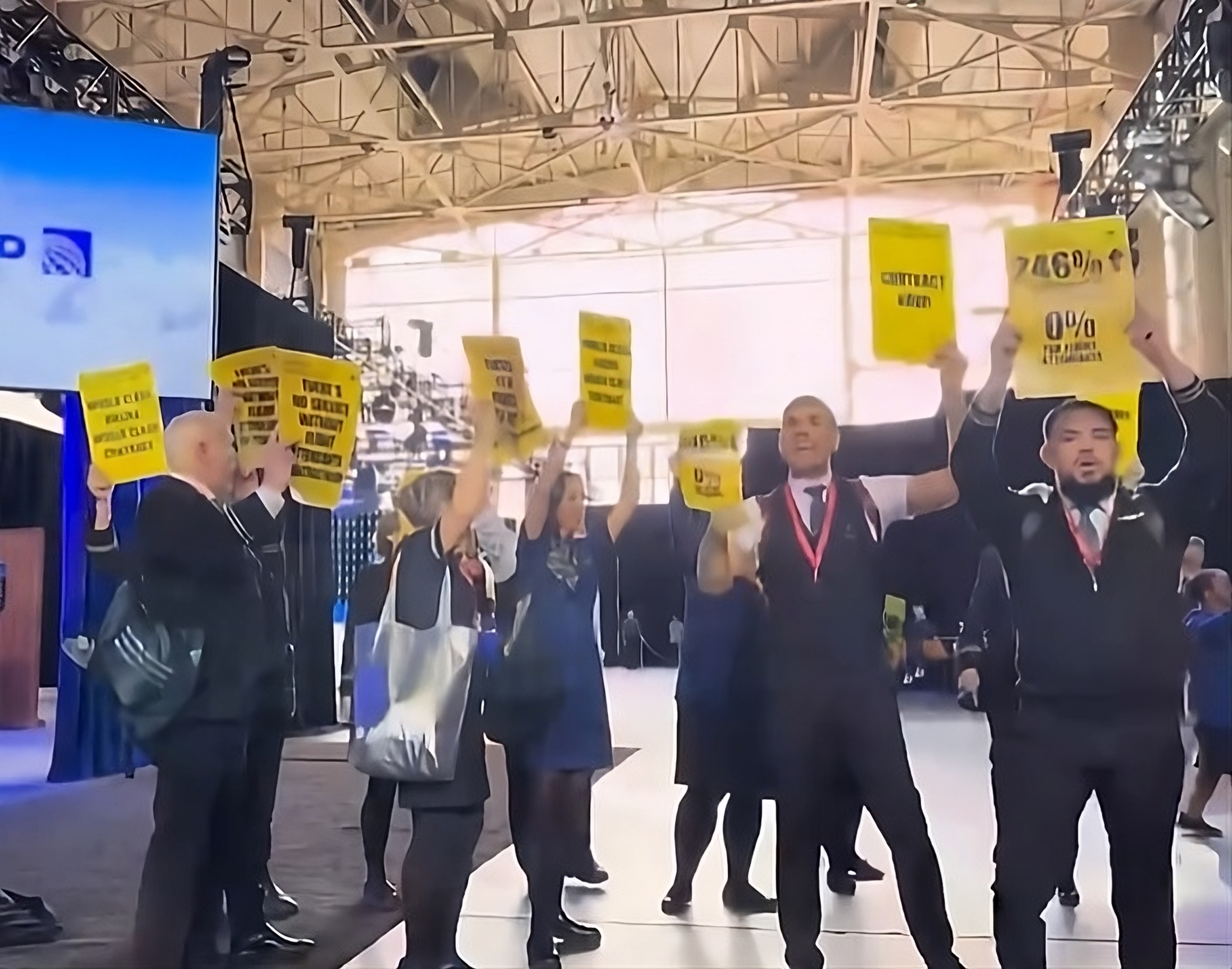Democrats to Introduce Bill to Block Trump's Attack on Birthright Citizenship
Rep. Delia Ramirez told The Intercept she will introduce legislation to stop Trump from restricting birthright citizenship. The post Democrats to Introduce Bill to Block Trump’s Attack on Birthright Citizenship appeared first on The Intercept.

As the Supreme Court weighs whether to allow the Trump administration to massively restrict birthright citizenship, Rep. Delia Ramirez, D-Ill., is attempting to use Congress’s power of the purse to block the administration’s attack on constitutionally protected rights.
In January, Trump signed Executive Order 14160, which would prevent children born in the United States and its territories from automatically becoming U.S. citizens if their parents are undocumented immigrants or on a temporary visa, such as a work or student visa.
Trump’s order was immediately blocked by lower courts on the basis of the 14th Amendment, which guarantees citizenship for “all persons born or naturalized in the United States and subject to the jurisdiction thereof.”
As the Supreme Court hears oral arguments on the case Thursday, Ramirez told The Intercept she will introduce a bill prohibiting the use of federal funds to carry out Trump’s executive order and reaffirming birthright citizenship.
This issue is personal for Ramirez, who is the only member of Congress born to parents who were undocumented at the time of her birth.
“My mother and father fled poverty in Guatemala, and my mother was pregnant with me when she came to this country, and I was born in Cook County Hospital in the city of Chicago. I still live in the same community,” said Ramirez. “The idea that [Trump] would call to question who’s American and who’s not — it’s absolutely, very personal to me.”
Ramirez said it’s clear that Trump’s executive order isn’t about immigration, it’s about upholding white supremacy — a fact further evidenced by his administration’s move to end temporary status for Afghan and Haitian immigrants, then immediately offer refugee status to white South Africans. “It’s pretty blatant that this is an attack that is seeded on white supremacy and racism,” she said.
The Issue of Injunctions
The oral arguments before the Supreme Court involve a case challenging several lower court decisions blocking the executive order from going into effect nationwide.
The Trump administration is arguing that lower court judges don’t have the power to issue nationwide injunctions and that these rulings should be limited in scope, if possible, to the specific people who brought cases. Five pregnant women in Maryland brought cases against the Trump administration, fearing for the citizenship status of their future children.
The administration is also challenging the ability of states to bring these cases on behalf of their residents. Four states have brought lawsuits against the administration’s executive order: Washington, Arizona, Illinois, and Oregon.
The consequences of the Supreme Court’s decision in this case could prove wide-ranging for civil liberties in the United States and challenges to the Trump administration’s sweeping agenda, legal experts said.
“No national injunction means that either we get checkerboard justice, where rights exist in some places and not in others,” said Margo Schlanger, a law professor at the University of Michigan Law School, “or we get this huge tax on the organizations that are trying to vindicate [these] rights that makes them litigate all over the place.”
Schlanger said the court may decide to weigh-in on the substantive issue of birthright citizenship, focus on the issue of nationwide injunctions, or both.
Sam Erman, another professor at the University of Michigan Law School, thinks it’s “highly unlikely” the Supreme Court will issue a ruling on birthright citizenship at this stage. Erman noted that the court has not had a full briefing on the issue of birthright citizenship. “It would be a very hurried decision if they did it,” he said, “and one where they would be sort of stripping themselves of a bunch of resources.”
There’s also the fact that this is largely considered a settled legal issue. In United States v. Wong Kim Ark, the court established that children born in the United States to children of noncitizens are citizens. Wong Kim Ark, decided in 1898, is largely considered settled precedent.
“It’s a pretty decided issue that the Supreme Court has itself basically presumed the result without giving it much thought in prior cases,” said Erman. “The Supreme Court’s precedent pretty much settles it. The history is all in one direction on it. The text is pretty clear.”
But as shown by the Supreme Court’s overturning of Roe v. Wade, legal precedents can fall, said Kailin Wu, an attorney at Haynes Novick Kohn Immigration in Washington, D.C. “The court is looking at opportunities to review previous decisions a lot more often now than they have been in the past, “said Wu. “I’m not going into oral arguments on Thursday feeling confident that this is going to come out in favor of maintaining the status quo.”
Erman said it will also be worth watching how the court handles the secondary legal issue of nationwide injunctions.
“Some justices have been signaling for a while that [nationwide injunctions] ought to be reined in in some way,” said Erman. “And this seems like a possible moment to do that.”
“One thing that’s at stake is the separation of powers between the different branches of government.”
On the flip side, justices could be concerned about maintaining the balance of power between the judiciary writ-large, Congress and the presidency. “One thing that’s at stake is the separation of powers between the different branches of government,” said Erman. “In theory, it should be up to Congress to change the statutory scheme that grants birthright citizenship at birth, and it should only be the Supreme Court that gets to say what the constitutional law is.”
Erman notes that outright banning nationwide injunctions, in this case, would get “messy fast.”
“If they were to say, ‘Well, now this only applies in the district where you filed,’ you would suddenly have people filing in every district in the country all at once,” he said, “or if you said this only applies to the individuals who filed, you’d get a flood of lawsuits by individuals seeking the same treatment.”
This scenario, Schlanger said, would make it significantly harder for organizations to fight for civil rights because they would have to battle in every jurisdiction — potentially leaving the United States with a patchwork of different citizenship rules.
“There will be a bunch of states in which courts have said the birthright citizenship EO is illegal or ineffective … and then there will be other districts, other states, where that hasn’t happened,” she explained. “So you have different rules governing the citizenship rights of newborns depending on what state they were born in.”
Wu said that his clients living in the U.S. on work visas are terrified about what the Trump administration’s executive order could mean for their families. For example, Wu said that his clients on H-1B visas are sometimes here for 15 to 30 years before they receive their green cards. Now, it’s unclear what could happen if they end up having children.
“Are their kids automatically going to get a [visa]? Are they going to need to apply for that? I think there are a lot of questions,” said Wu. “You may end up in scenarios where people who are here on temporary status and who have kids who are born here are inevitably going to leave at some point.”
Legal scholars said to watch whether justices ask more about birthright citizenship or nationwide injunctions as an indicator of which issue they’re more likely to address. And as always, all eyes are on Chief Justice John Roberts, who is widely considered to be a swing vote on these issues.
However, Erman said, regardless of how the justices eventually rule, it shouldn’t be seen as an indicator that the Supreme Court is on the side of people fighting the administration.
“The administration is on very weak substantive ground here,” said Erman,“and so were the courts to uphold what the administration is trying to do. That’s a strong signal that they’re going to be, I think, deferential to lots of claims by the administration.”
Withholding Funding
In Congress, Ramirez isn’t holding out hope that her Republican colleagues will help her protect birthright citizenship. “I’ve had some off-the-record conversations with a couple of them, who said, ‘No, that’s absolutely crazy, if you were born here, you’re a United States citizen,’” she said. “But the problem is, that has not actually been lived out in remarks or public statements.”
Still, Ramirez thinks it’s important to take a stand for this fundamental right.
In addition to affirming the constitutional right of all children born in the United States to automatically obtain U.S. citizenship, the bill uses Congress’s spending powers to block the administration’s actions.
The legislation would prohibit any federal funds from being used to carry out Trump’s executive order. So even if the Supreme Court ruled that Trump could move forward implementing the executive order, his administration would be blocked from using federal funding to create new systems to identify who is or isn’t a citizen, change someone’s citizenship status, or deport them. If Ramirez’s legislation can pass in the House and find backing in the Republican-controlled Senate, it would render Trump’s campaign against birthright citizenship an order in name only.
“We’re going to have a strong showing. Over 100 members of Congress are original co-sponsors to this bill,” said Ramirez. “People are really riled up to fight back and understand that attempting to erode birthright citizenship is literally attempting to erode our democracy itself.”
The post Democrats to Introduce Bill to Block Trump’s Attack on Birthright Citizenship appeared first on The Intercept.











![[DEALS] The 2025 Ultimate GenAI Masterclass Bundle (87% off) & Other Deals Up To 98% Off – Offers End Soon!](https://www.javacodegeeks.com/wp-content/uploads/2012/12/jcg-logo.jpg)







-Olekcii_Mach_Alamy.jpg?width=1280&auto=webp&quality=80&disable=upscale#)




















![Air Traffic Controller Claps Back At United CEO Scott Kirby: ‘You’re The Problem At Newark’ [Roundup]](https://viewfromthewing.com/wp-content/uploads/2025/05/scott-kirby-on-stage.jpg?#)



































